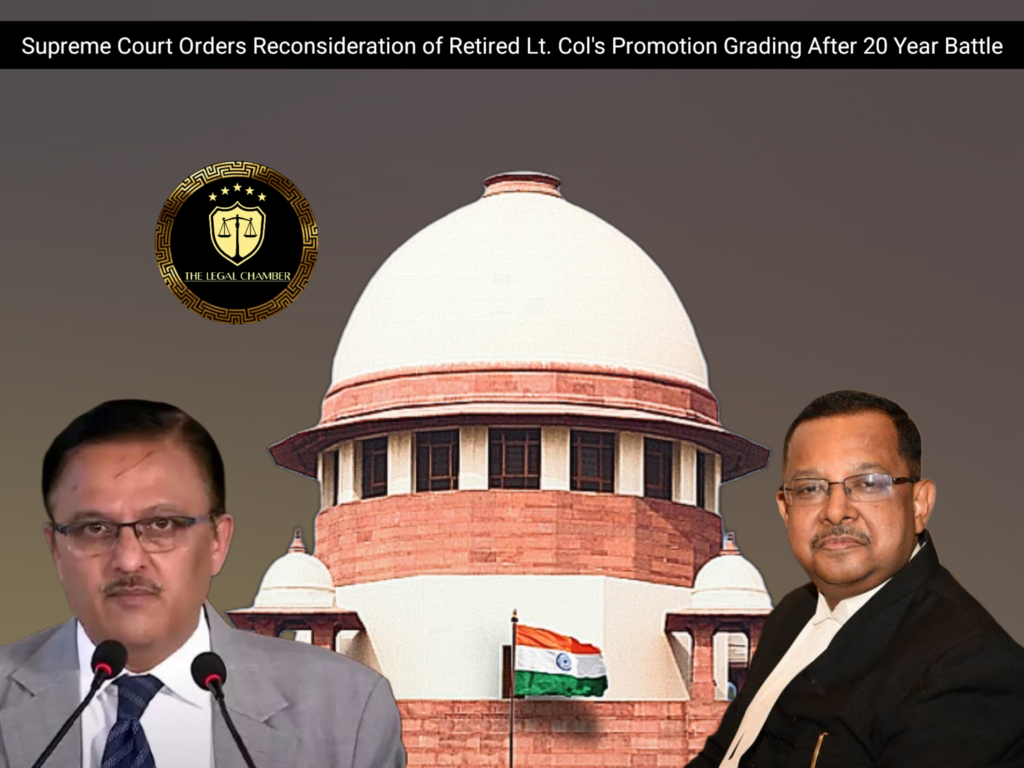
The Supreme Court partially allowed the civil appeal, upholding the Armed Forces Tribunal’s decision but directing reconsideration of the appellant’s ‘Z’ grading in the 2001 promotion board. The Court affirmed the Chief of Army Staff’s discretionary authority under Defence Services Regulations to modify Selection Board recommendations, while emphasizing fair reconsideration of the appellant’s case within three months. The judgment clarified that promotions in the Territorial Army remain subject to the Army’s hierarchical decision-making process, balancing institutional autonomy with individual rights to equitable evaluation.
Facts Of The Case:
The case involved Lt. Col. NK Ghai (Retd.), who challenged his non-promotion to Colonel rank despite 22 years of service in the Territorial Army. Between 2000-2003, five Selection Boards consistently graded him ‘Z’ (unfit for promotion), while another officer’s ‘Z’ grading was upgraded to ‘B’ by the Chief of Army Staff (COAS). Ghai filed multiple statutory complaints and a writ petition before the Delhi High Court, later transferred to the Armed Forces Tribunal, which in 2017 upheld the Army’s decision. The Supreme Court appeal centered on alleged arbitrariness in promotion denial, particularly highlighting the differential treatment when the COAS upgraded another officer’s grading. The Army defended its process, citing Regulation 108(d) of Defence Services Regulations that grants COAS discretionary power to modify Selection Board recommendations. The Court examined sealed records of five Selection Board proceedings confirming Ghai’s consistent ‘Z’ grading. While acknowledging the Army’s promotion autonomy, the judgment noted the COAS’s reconsideration for another officer created an inequity requiring Ghai’s case to be similarly revisited. The Court partially allowed the appeal, directing the COAS to re-examine Ghai’s 2001 grading within three months, but upheld other aspects of the Tribunal’s decision, maintaining institutional deference to military promotion policies while addressing individual grievances.
Procedural History:
The procedural history of Lt. Col. NK Ghai (Retd.) vs. Union of India traces a protracted legal battle spanning over two decades. The appellant first challenged his non-promotion through statutory complaints filed between 2000–2003, all of which were rejected. In 2006, he approached the Delhi High Court via Writ Petition (C) No. 8370 of 2006, which was later transferred to the Armed Forces Tribunal (AFT). The AFT, in its 2017 judgment, upheld the Army’s decision, prompting the appellant to file Civil Appeal No. 4653 of 2018 before the Supreme Court. During the Supreme Court proceedings, the appellant argued in person, while the Union of India relied on sealed Selection Board records to justify the grading system. The Court’s 2025 judgment partially allowed the appeal, directing reconsideration of the appellant’s 2001 grading but otherwise affirming institutional autonomy in promotions. This trajectory underscores the interplay between military administrative processes and judicial review, with courts exercising restraint while ensuring procedural fairness.
READ ALSO: Ex-MLA’s Plea Rejected: Supreme Court Rules Against Fraud Claims in Rs. 2426 Crore Irrigation Scheme
Court Observation:
The Supreme Court made several critical observations in Lt. Col. NK Ghai (Retd.) vs. Union of India while balancing institutional autonomy with individual rights. The Court acknowledged the Army’s discretionary powers under Defence Services Regulations (Paragraph 108), affirming that the Chief of Army Staff (COAS) retains authority to modify Selection Board recommendations. However, it noted an arbitrary disparity in the COAS’s decision to upgrade another officer’s ‘Z’ grading while denying similar reconsideration to the appellant, despite comparable service records. The Court emphasized that while judicial interference in military promotions is limited, procedural fairness must be ensured. It scrutinized the sealed Selection Board records, confirming the appellant’s consistent ‘Z’ grading but highlighted the absence of reasoned justification for rejecting his statutory complaints. The judgment underscored that hierarchical discretion cannot override equitable treatment, especially when similarly placed officers receive differential consideration.Ultimately, the Court upheld the primacy of institutional processes but directed the COAS to re-examine the appellant’s 2001 grading within three months, observing that selective reconsideration of promotions risks undermining legitimacy in decision-making. The ruling reinforced that while courts defer to specialized domains like defense services, they retain oversight to prevent manifest injustice.
Final Decision & Judgement:
The Supreme Court delivered a nuanced judgment in Lt. Col. NK Ghai (Retd.) vs. Union of India, partially allowing the appeal while maintaining deference to military decision-making. The Court upheld the institutional autonomy of the Armed Forces under Defence Services Regulations, recognizing the Chief of Army Staff’s discretionary power to modify Selection Board recommendations. However, it identified an inequity in the differential treatment of the appellant compared to another officer whose ‘Z’ grading was upgraded by the COAS. While refusing to interfere with the overall promotion process or order retrospective promotion, the Court specifically directed reconsideration of the appellant’s June 2001 grading within three months, leaving open the possibility of notional benefits if the grading were revised. The judgment balanced judicial oversight with institutional independence, emphasizing that while courts generally refrain from interfering in military promotions, they retain authority to address demonstrable arbitrariness in individual cases to ensure procedural fairness. The ruling clarified that such interventions remain exceptional and fact-specific, preserving the military’s operational discretion while safeguarding fundamental principles of equality in administrative decision-making.
Case Details:
Case Title: Lt. Col. NK Ghai (Retd.) vs. Union of India & Another Citation: 2025 INSC 750 Case Number: Civil Appeal No. 4653 of 2018 Date of Judgment: May 21, 2025 Bench: Justice Abhay S. Oka & Justice Ujjal Bhuyan
Download The Judgement Here